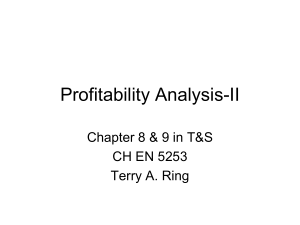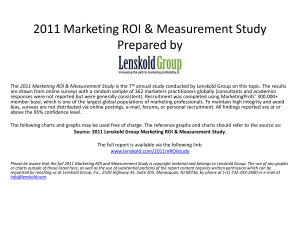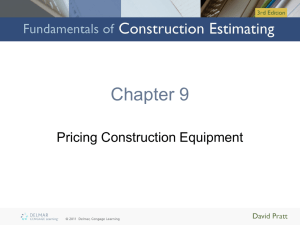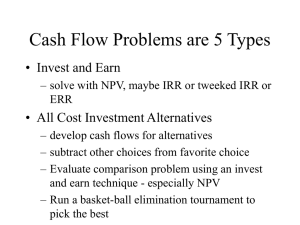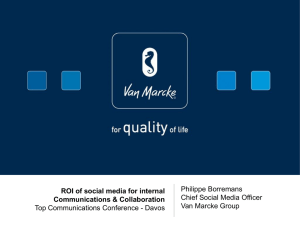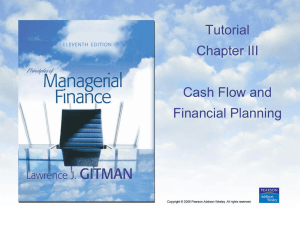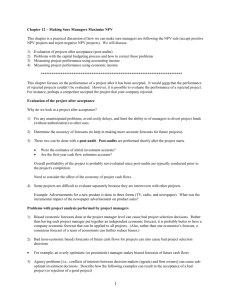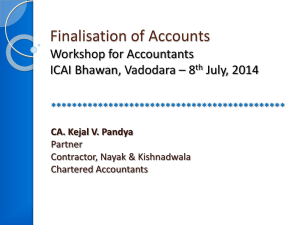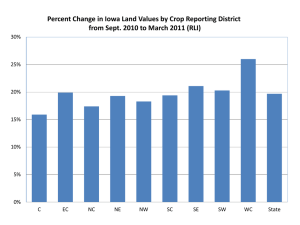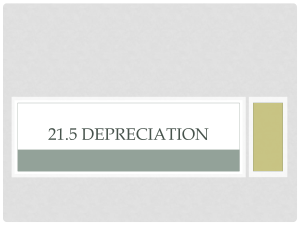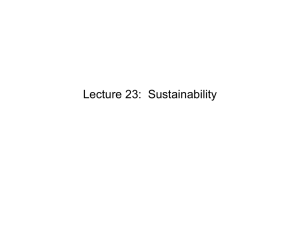7-L1-Profit Analysis - Department of Chemical Engineering
advertisement
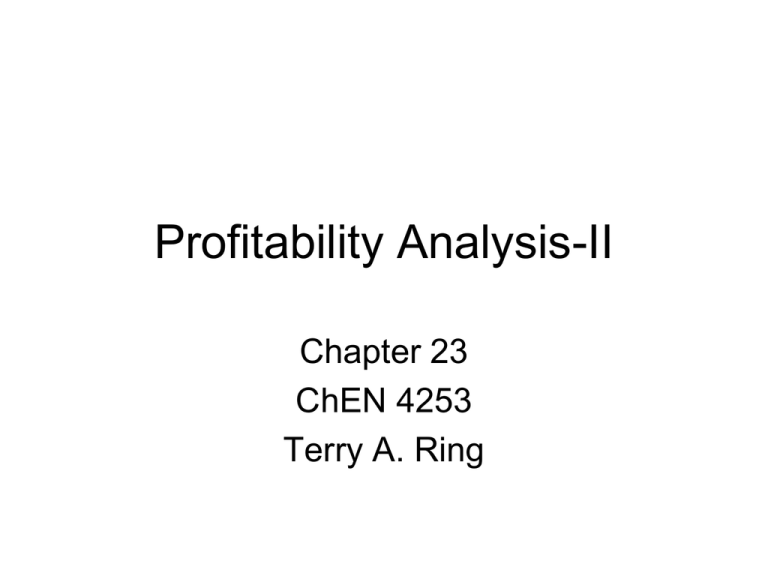
Profitability Analysis-II Chapter 23 ChEN 4253 Terry A. Ring Measures of Profitability • Return on Investment (ROI) – ROI=annual earnings/capital investment – ROI > cost of capital (commercial interest rate, i) • • • • • Payback period (PBP) Annualized Cost (CA) Venture profit (VP) Same Investor’s Rate of Return (IRR) Discounted Cash Flow Rate of Return (DCFR) • Hard work to get this all together Definitions of Profitability Measures How to determine ROI • Sales revenue minus Costs – Cost of feedstocks – Cost of Utilities – Cost of Labor and Maintenance – Cost of Overhead – Cost of Taxes and Insurance – Cost of Depreciation – Cost of sales force, R&D, Admin., Management Incentives Utilities • • • • Steam Electricity Cooling Water Process Water – Boiler Water – Feed Stock water/Steam • Refrigeration • Fuels – Natural Gas – Fuel Oil – Coal • Waste Treatment – Stack Gas Cleanup – Waste Water Treatment • Land fill cost for solid waste Costs Depreciation • Straight-line Depreciation – Equipment Lifetime – Plant = 12 yr – Constant % each year so that plant is totally written off at end of life time • 8% of Total Depreciable Capital, CTDC – What would be the depreciation % for 20 yr lifetime? • Other types of depreciation – – – – – Accelerated Cost Recovery System (ARCS) Modified Accelerated Cost Recovery System (MARCS) for Taxes Declining-Balance Method (DB) Double Declining-Balance Method (DDB) Others More On Depreciation • Declining Balance Method (no salvage value) – d= range from 1/n to 2/n, typically use 1.5/n • Double Declining Balance Method (no salvage value) – d=2/n • Depreciation amount for year t, Dt=B*d*(1-d)t-1 • Book Value after year t, BVt-1 =B(1-d)t-1 – B=basis = CTDC – n= service life – t=year More On Depreciation • ACRS – Federal Tax Law 1982 – 1986 • MACRS - Federal Tax Law in 1987 Accelerated Cost Recovery System More on Depletion (of natural resource) • Cost Depletion = Units recovered this year*Unit value – Unit Value = Cost to acquire resource/estimate of recoverable units • Percentage Depletion Taxes • Property Taxes – Based upon the value of the property • Used in Cost of Manufacturing • Severance Tax = 12.5% of extracted mineral’s net value • State Taxes – Very between states, UT = 6.2% • Federal Income Tax for Business – Typically taken to be 34% of gross earnings Total Production Cost, C • Cost of Manufacturing minus general expenses • C=COM-General Expenses • General Expenses – Selling expenses, R&D, Admin. (top management), Management Incentive Package Cost of Manufacturing (COM) • Direct manufacturing costs – Feedstocks, Utilities, labor related to operations, maintenance • Operating overhead • Fixed costs – Property Tax, Insurance, Depreciation Pre-tax (Gross) Earnings • Gross Earnings = Sales (S) – Total Productin Cost (C) • Net Earnings(Profit) = (1-t) Gross Earnings – Tax (t) = State (UT=6.2%) + Federal taxes (34%) Working Capital, CWC Typically 15 % CTCI More Accurate Working Capital Calculation CWC=Cash Reserves+Inventory+accounts receivableaccounts payable • Cash reserves - 30 days of raw materials, utilities, operations, Maintenance, operating overhead, property taxes, insurance and depreciation 8.33% of COM • Inventories = 7 days of products at sales prices • Accounts receivable - 30 days at sales price 8.33% of annual sales • Accounts payable – 30 days of feedstocks at purchase price, 8.33% of annual feed stock costs Table 23.1 Components of Total Capital Investment, CTCI. Modified from Sieder, et. al., 2004. Category Symbol and Definition Total Bare-module Cost for Fabricated CFE= sum of costs for all fabricated Equipment equipment Total Bare-module Cost for Process CPM= sum of costs for all process Machinery machinery Total Bare-module Cost for Spares Cspares= sum of costs for all spares Total Bare-module Cost for Storage and Cstorage= sum of costs for all tanks Surge Tanks Total Cost for Initial Catalyst Charges Ccatalyst= sum of costs for all catalysts Total Bare Module Investment (TBM) CTBM= CFE+ CPM + Cspares + Cstorage+ Ccatalyst Cost of Site Preparation Csite= 10-20% of CTBM Cost of Service Facilities Cserv=20% of CTBM Allocated Costs for Utility Plants and Calloc= sum of costs listed below (T22.12) Related Facilities Capital Cost Steam $820(S/(lb/hr))0.81 Electricity $2.6e6(S/MW)0.83 Cooling Water $1,000(S/gpm)0.68 Process Water $1,500(S/gpm)0.96 Refrigeration $11,000(S/ton)0.77 Liquid Waste Disposal $3.00/1,000 gpy gpy=gallons/yr Total Direct Permanent Investment (DPI) CDPI=CTBM+Csite+Cserv+Calloc Cost for Contingencies and Contractor Ccont=18% of CDPI Fees Total Depreciable Capital (TDC) CTDC=CDPI+Ccont Cost of Land Cland=2% of CTDC Cost of Royalties for Intellectual Croyal=1-5% of Sales (S) Property or 2% of CTDC+3% of Sales (S) Cost of Plant Startup Cstartup=2-10% of CTDC Total Permanent Investment (TPI) CTPI= FISF(CTDC+Cland+Croyal+Cstartup) Working Capital CWC=0.0833*COM+0.0192*S +0.0833*S+0.0833*Cfeedstocks Total Capital Investment (TCI) CTCI = CTPI+CWC Notes: FISF is Investment Site Factor see Table 22.13, a factor of 1.15 was used for Utah and 1.25 used for Alaska Definitions of Profitability Measures Selling Price for Given ROI • For a new product without an established market • Sale price may very – High Sales price • Assume ROI say 40% (This is a home run!!) • Back calculate the sales price. – Low Sales price • Set VP to Zero • Back calculate the sales price • (this is the same as ROI calc above when or imin is 20%) ROI is not good enough for cash poor companies • They use annual Cash flow • Years of Plant construction CF = -fCTDC-CWC-Cland • Years of Plant Operation CF = (1-t)(S-C)+D • Depreciation D=fCTDC • f= fraction of TDC which is depreciated that year Using Excel for Profitability Analysis • User name “student” • Password “engineer” • • • • Steps to get ready Get Chemical Prices Get Cost of Utilities Run Aspen/ProMax – Production Rates (kg/y) – Utilities used (kg/y) • Determine installed cost of equipment • Only then are you ready to use this spread sheet
